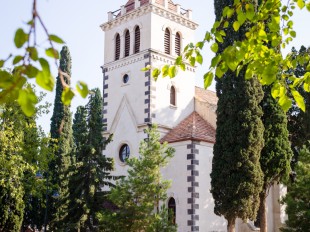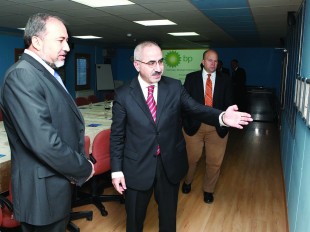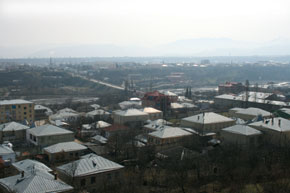 Qirmizi Qesebe, where Muslims and Jews live peacefully and devoutly together
Qirmizi Qesebe, where Muslims and Jews live peacefully and devoutly together …The shoemaker Uncle Avshalum was supposed to meet us in Qirmizi Qesebe - Red Settlement - located on the left bank of the Gudyalchay that springs from the Great Caucasus Mountains. We tried and tried to reach his phone at the entrance to the settlement but his phone was off. If our driver Yusif did not decide to start speaking, we would have to wait under rain at least before we reached our guide on the phone. We had also taken the contact details for Nisim Nisimov, chairman of the municipality and Pisakh Isaakov, executive representative of the village, but we saw no need for formalities. Why? We wanted to meet simple Jewish residents of a settlement which has produced three billionaires (as recorded in Forbes) and to write a story about a unique place where Muslims and Jews live peacefully together.
That is indeed the case. There hasn’t been a single incident in Qirmizi Qesebe, this village of the Quba region, north of Baku. Nisim Nisimov was to say jokingly: If a child doesn’t fight with another child…
Moreover, we were in the settlement on a Saturday, the day of prayer for Jews and that is why we could not even take a picture of the settlement’s main synagogue, the centre where everybody prays. The local rabbi said that we could take pictures, even inside, on any other day, but not on the Shabbat (Saturday). It turns out that Uncle Avshalum was praying at that moment…
They even wanted to rename Qirmizi Qesebe ‘Fatali Khan’…
Most people in Qirmizi Qesebe are Mountain Jews. One can easily communicate in three languages: Azerbaijani, Russian and Juhuri/Tat.
The settlement is the only place in Azerbaijan or in the former USSR, where the moral, cultural and religious values of the Mountain Jews are still preserved. Qirmizi Qesebe is called the Caucasian Jerusalem for good reason.
After Azerbaijan gained independence, just as all the mosques were allowed to function, so too were the synagogues. The government of Azerbaijan issued orders to allow the Jews in Qirmizi Qesebe to preserve their traditions and customs, study the foundations of Judaism and learn their own language and culture. These orders still stand.
According to Boris Semanduyev, head of the Religious Community of Mountain Jews, historical sources show that the Jews settled in Azerbaijan approximately 2,500 years ago. The history of Qirmizi Qesebe goes back approximately three centuries. While eight thousand Jews once lived here, the population now is around 4,000.
The village’s central street is named after Fatali Khan who was Khan of Quba in the 18th century (he ruled the settlement from 1758 to 1789 – ed.) Sources indicate that he treated the Jews very kindly and they lived under his protection. By the way, with independence, the locals changed the name of a street that had honoured Lenin back to Fatali Khan Street. By request of the people of the Qirmizi Qesebe, in the early 90s the Milli Majlis issued an order to rename the settlement itself Fatali Khan. However, the parliamentary order was not accepted and the old name remains.
How did the Jews move here?
Historical sources tell us that the Mountain Jews living in Quba owe their move here to Husseinali Khan (founder of the Quba khanate, ruled from 1747-1758 – ed.) and his son Fatali Khan. Their migration to Quba took place during the reign of Nadir Shah of Iran (1736-1747). The Jews he brought in during his seizure of Quba were at first located between the villages of Qeleduz and Kupchal. Their elders went to the palace of Husseinali Khan to request his protection and with his consent they were allocated territory in the upper part of the present day Qirmizi Qesebe. In 1765 Fatali Khan moved them into the area they now inhabit in order to protect them from night-time attacks or invasions. The Jews were assisted with transport and other palace facilities and the move was completed in six days. They built their synagogue on the spot where they greeted Fatali Khan with the traditional salt and bread.
Many of the men in the settlement spend their leisure time in the chaykhanas (tea houses), often playing nard (backgammon), Muslim Azerbaijanis among them. Elmar from Quba city says that he visits the Qirmizi Qesebe quite often to join in the games. The Qudyalchay river flows between the Muslims’ villages and the Jewish settlement. Some Muslim Azerbaijanis live in the Settlement and they have to cross to the other side of the river to pray in a mosque; there are also a few Russians and Lezghis. Elmar believes there are many differences between the Mountain and other Jews, in their speech and in their traditions. Their Juhuri/Tat language resembles Persian. They have also adopted several local traditions and customs; at weddings, for example, women and men sit together.
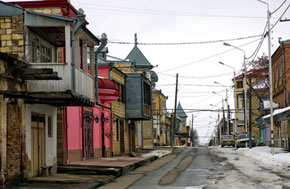 School that caters for several nationalities
School that caters for several nationalities Although the settlement is quite small, it is notable for its large and impressive homes, expensive cars and particular customs and habits. The local population says the settlement’s rich appearance is due to the successful business dealings of their compatriots working abroad. There are currently two schools in Qirmizi Qesebe. The elementary classes in these schools teach pupils in several languages – Azerbaijani, Russian, Hebrew, Tat and Lezghi.
Yavusha Simanduyev, director of the Isaac Khanukov Middle School number 1 regards Azerbaijan as his motherland. He tells us that the school has been completely reconstructed. As with the students, the teachers responsible for their education represent different nations: Azerbaijani, Jewish, Russian and Lezghi. While most lessons are taught in Azerbaijani, Hebrew is taught as a specific language in the elementary section. There is a state-registered college in the settlement where students who want to study their mother tongue and history can attend after school classes.
The director holds that the Azerbaijanis and Jews are two friendly nations:
The Jewish people are not looked after in other Muslim countries as they are in Azerbaijan. It is a historic fact that Jews were massacred in Ukraine and are still persecuted in a huge country like Russia. There is a completely hostile policy against the Jews in Iran. However the Azerbaijanis have always shared their bread with Jews. I would like to tell you a very interesting story. My father-in-law fought in the Second World War. In one battle he was captured by the fascists who would inflict unbelievable tortures and carry out mass shootings of Jews and communists. In order to distinguish Caucasus Jews from the others, the fascists asked them to recite the Kelmeyi-shehadet (the Islamic declaration that there is only one God and Mohammed is his prophet). An Azerbaijani doctor called Abdulla, who was with my father-in-law in the concentration camp, taught him the Kelmeyi-shehadet and the rudimentary fundamentals of the Islamic religion in one night. Thus, the next morning he was able to recite the Kelmeyi-shehadet and he escaped execution. If it hadn’t been Doctor Abdulla, but a Russian or Armenian, they would never have been so kind to that captured Jew. The Azerbaijanis have always treated the Jewish kindly. We will never forget it.
A newspaper and magazine distributed even in America…
Which village in Azerbaijan has its own newspaper? Qirmizi Qesebe publishes its own magazine Birlik-Yedinstvo (Unity). Moreover, it is published in two languages, Russian and Azerbaijani. The editorial offices consist of three rooms and there are only 7 people on the staff. The newspaper is published once a week and in four colours. Some newspapers published in Baku might envy both the quality of publishing and its technical equipment. This village newspaper even has its own website which is updated on a regular basis. We asked why the website was called stmegi.com. Najafqulu muellim tells us that there is a STMEGI Foundation headquartered in Moscow. STMEGI is actually an acronym formed from the first letters of the names of the Zakharayev brothers who come from the village: Solomon, Telman, Maxim, Eduard, German and Isay. The newspaper is circulated free of charge, not only in Quba, but also in Russia, Israel and the USA. There is also a supplementary magazine, Qudyal, published four times a year.
We walked around the village. The streets are very neat and, most important, clean. Although the population fell during the decline of the Soviet Union, there are still 4,000 people here. Pisakh muellim tells us:
Most of them moved to Israel, America and Russia back in the ‘70s. There were also some who moved after the collapse of the USSR. However, the most interesting thing is that there were those who have returned. Most of them are the elders. They return to spend their last days in the village.
A representative of the executive authority, Pisakh muellim says that most people are involved in agriculture:
Like everybody else, we were given a share of the land and we usually make our living from that piece of land. Some even live and work in Russia, America and Israel. They also help a lot. Other than that we have already mentioned that we are helped by the STMEGI foundation and other wealthy people.
Famous sons
Word has it that expatriates now working in Russia, Israel and America visit the village at least two or three times a year, take an interest in the problems of the local population and give support. I mentioned a unique fact about this village at the start of this article, and now I will reveal the names of three billionaires who come from Qirmizi Qesebe: Messrs. Iliyev, Bunyaminov and Nisanov have, as I wrote, been noted in the famous Forbes magazine.
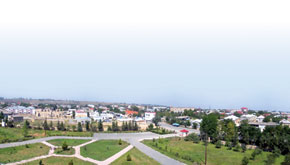 We Jews have a tradition. We organize a special celebration when a child turns 13. The day that a child reaches adolescence is considered holy and is celebrated joyously. They flew in Ibrahim Tatlises (a famous Turkish singer – ed.) on a private jet for the 13th birthday of billionaire Bunyaminov’s son; the family is from this settlement. The celebration was held in the Princess palace. Tatlises returned the same evening.
We Jews have a tradition. We organize a special celebration when a child turns 13. The day that a child reaches adolescence is considered holy and is celebrated joyously. They flew in Ibrahim Tatlises (a famous Turkish singer – ed.) on a private jet for the 13th birthday of billionaire Bunyaminov’s son; the family is from this settlement. The celebration was held in the Princess palace. Tatlises returned the same evening. Local people say that many famous people have visited, for example Soso Pavliashvili, Sophia Rotaru, even Primakov. It is quite interesting that the first two are celebrity singers, but what brought Primakov here? (Yevgeni Maximovich Primakov – Minister of Foreign Affairs of the Russian Federation from 1996-98 and head of government from 1998-99 – ed.) They say that he simply visited as a guest, that’s all.
During the several hours that we were in the village it was striking that we did not see any women on the streets. When we asked why it became clear that the Jewish women rarely go outside, not even to the markets or open bazaars. One of the settlement’s most interesting customs is that a wedding only takes place when the girl likes the parents of the boy. Then the boy has no choice but to agree to the marriage. Divorces in the village are regarded almost as a tragedy and are very rare.
Shadkhan Uncle Sava
At this point it is impossible not to talk about Sava Ikiilov. Now you might well ask who this Sava Ikhiilov is. Uncle Sava was settlement postman for a long time. He knew every house. He knew how many people lived in every house, how many men and how many women. He knew which of them were single. And the bachelors are the reason we mentioned Uncle Sava. The point is that Uncle Sava has the sacred profession of shadkhan in Judaism - matchmaker. It is widely believed that no marriage arranged by Uncle Sava had ended in divorce:
He is a very wise man, a true master of his profession. You wouldn’t believe it, but he isn’t only the matchmaker for Qirmizi Qesebe; Mountain Jews living in Derbent, Israel, Moscow and even the USA seek out Uncle Sava to go and ask for the bride.
At present Uncle Sava lives in Moscow. Despite the distance, he is still very eager to accept all the requests made of him.
Most of the houses in Qirmizi Qesebe (Red Settlement) are red in colour and there are 6-pointed stars on the tops of almost every house. Most of the streets are named after famous intellectuals who came from the village.
We asked people who were born and brought up in Qirmizi Qesebe and who had never seen Israel how they introduced Israel to their children; they said that they only have videos, but they were not dismayed. For Mountain Jews living in a settlement far from Israel, Qirmizi Qesebe is a homeland.
Presidential consideration
The Azerbaijani government does indeed pay special attention to the settlement. It is no coincidence that each time President Ilham Aliyev travels to Quba, he visits Qirmizi Qesebe, takes an interest in their problems and meets with the elders. The Mountain Jews are also deeply concerned about the biggest problem facing Azerbaijanis. We are talking, of course, about Karabakh.
Tomorrow, when our Commander-in-Chief issues an order to liberate our lands, the Mountain Jews will be among the first in line – say people of the settlement.
Qirmizi Qesebe

